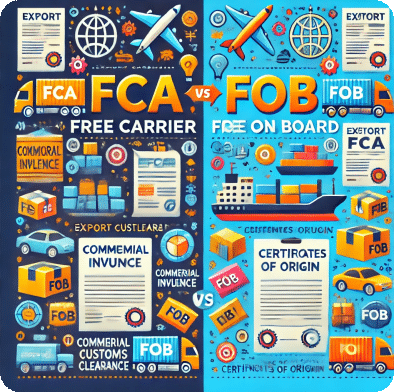Understanding the Difference Between FCA and FOB in International Shipping
When you’re dealing with international shipping, especially as an importer or exporter, knowing the nuances of Incoterms like FCA (Free Carrier) and FOB (Free On Board) is essential. Choosing the right Incoterm can greatly influence how responsibilities, risks, and costs are divided between the buyer and the seller.
In this guide, we will dive into the key differences between FCA and FOB, helping you make informed decisions for your shipping needs. Let’s explore how Tonlexing can assist you with both options.

What Is FCA (Free Carrier)?
Free Carrier (FCA) is an Incoterm issued by the International Chamber of Commerce. It applies to all modes of transportation, whether by air, sea, or land. Under FCA, the seller is responsible for delivering the goods to the location designated by the buyer, typically a warehouse, port, or another facility, and must handle customs clearance.
Once the goods arrive at the designated location, the responsibility and risk transfer to the buyer. If the handover happens outside of the seller’s factory, unloading costs might not be included unless explicitly agreed upon.
Key responsibilities of the buyer under FCA:
- Payment of transportation costs from the designated location to the final destination.
- Bearing the risk once the goods have been delivered to the agreed point.
- Arranging cargo insurance for the transportation phase beyond the seller’s responsibility.
What Is FOB (Free On Board)?
Free On Board (FOB) applies mainly to sea and inland waterway transport. Under FOB, the seller’s obligations end when the goods are loaded onto the vessel. The seller also handles export customs clearance and documentation, while the buyer is responsible for freight costs and risks once the goods are on board.
With FOB, the buyer must:
- Cover transportation and insurance costs from the point of loading onto the vessel.
- Handle import customs clearance and the associated charges upon arrival at the destination.
At Tonlexing, we offer customized FOB services, ensuring all documentation, customs processes, and logistics are handled efficiently. We have experience working with various shipping lines and can optimize costs, whether for full containers (FCL) or less than container loads (LCL).
Key Differences Between FCA and FOB
| Aspect | FCA | FOB |
|---|---|---|
| Mode of Transport | Applicable to all transport modes (air, sea, road) | Primarily for sea and inland waterways |
| Risk Transfer | At the designated point (e.g., buyer’s warehouse) | Once the goods are loaded onto the vessel |
| Customs Responsibility | Seller clears export customs | Seller clears export customs |
| Delivery Point | Seller delivers to a location designated by the buyer | Seller delivers goods on board the buyer’s nominated vessel |
| Insurance | Buyer’s responsibility after goods are delivered | Buyer’s responsibility after goods are loaded on the vessel |
Similarities Between FCA and FOB
Both FCA and FOB require the seller to:
- Complete export customs clearance.
- Provide appropriate shipping documents such as the commercial invoice and certificate of origin.
- Ensure goods are prepared according to the buyer’s requirements.

Which Incoterm Should You Choose?
Selecting between FCA and FOB depends on several factors, such as the type of shipment, mode of transport, and the buyer’s preferred level of control over logistics. If you want more control over transportation from the seller’s warehouse to your facility, FOB might be a better choice. On the other hand, FCA provides flexibility across various transportation methods.
At Tonlexing, our logistics experts can help you navigate these decisions and ensure that you are choosing the right Incoterm for your specific needs. We specialize in providing customized logistics solutions that are cost-effective and secure, whether you’re shipping by air, sea, or road.
How Can Tonlexing Help?
Understanding Incoterms like FCA and FOB is crucial for mitigating risks and controlling costs. At Tonlexing, with over a decade of experience, we offer tailored logistics solutions, including FCA and FOB services, to meet the diverse needs of our clients.
- We provide comprehensive shipping consultation, ensuring that you get the best possible rates for both FCA and FOB.
- Our door-to-door services reduce complexity and ensure smooth operations from the point of origin to your warehouse.
- We assist in handling complex customs procedures and documentation, so you don’t have to worry about delays or hidden fees.
Feel free to contact us at Tonlexing to discuss how we can help you with your next shipment, whether under FCA, FOB, or any other Incoterm.


